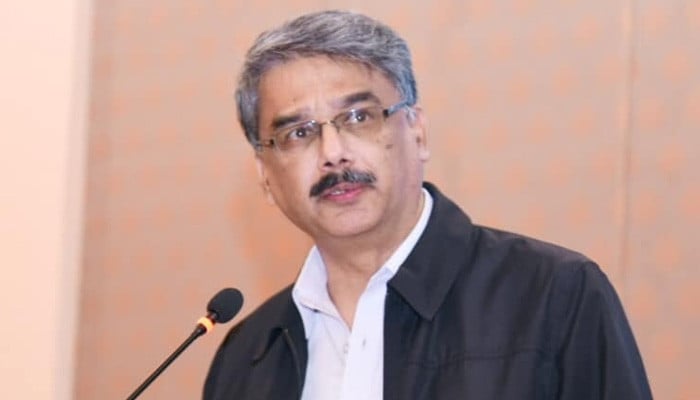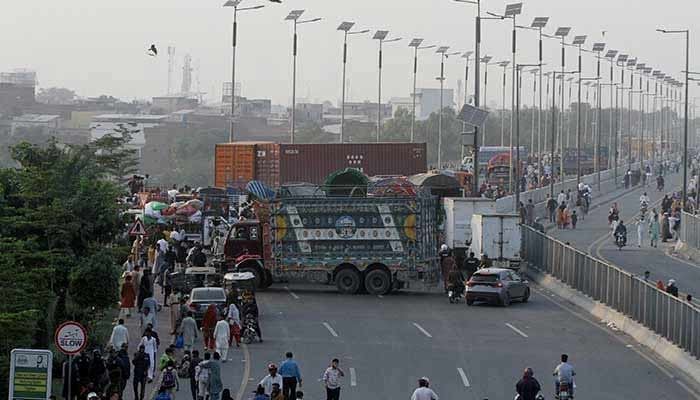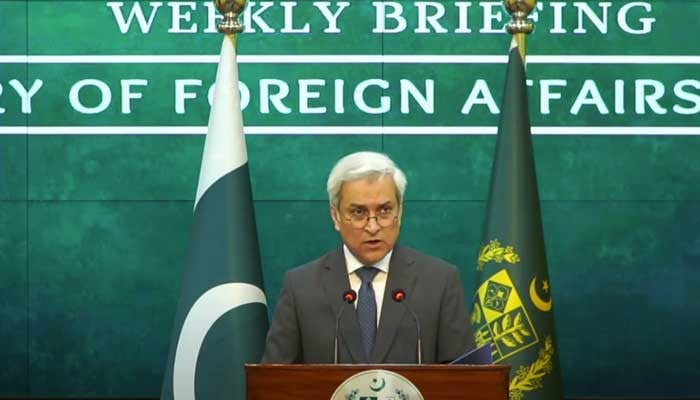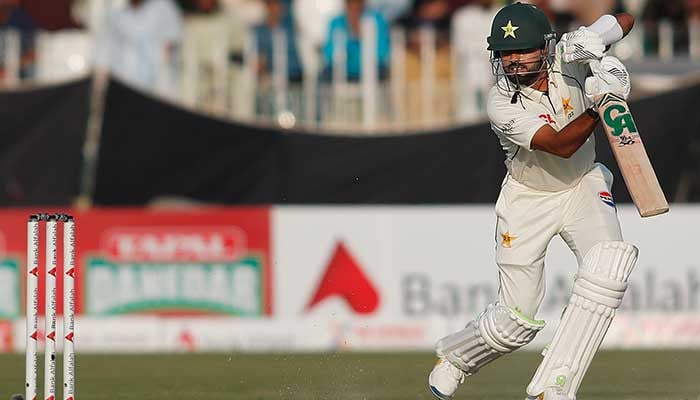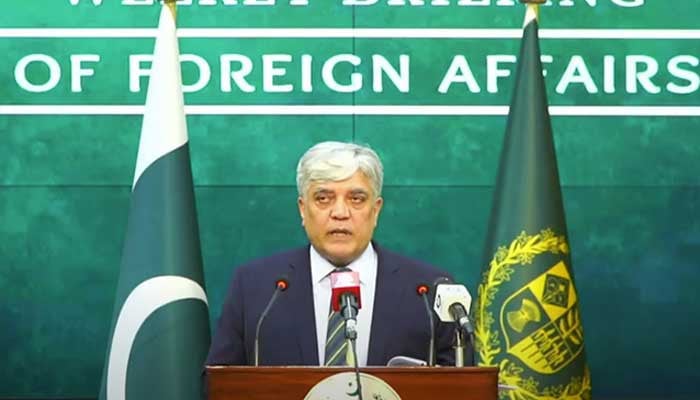
Foreign Office spokesperson Shafqat Ali Khan addresses the weekly press briefing on October 17, 2025. — Screengrab via Geo News
#Pakistan #Afghanistan #dialogue #peaceful #resolution
ISLAMABAD: The Foreign Office on Friday said that Pakistan and Afghanistan are engaged in constructive dialogue aimed at resolving border tensions through peaceful means.
In his weekly press briefing, FO spokesperson Shafqat Ali Khan said that Pakistan had repeatedly informed Kabul about the presence of Fitna al-Kharj inside Afghanistan.
He expressed deep concern over “provocative attacks” by the Taliban along the border between October 11 and 15, which Pakistan effectively repulsed in self-defence.
The spokesman said that their use has caused significant damage to the Taliban forces and terrorist hideouts. He said, “Our retaliation was not against civilians, but against terrorist elements.
Khan said that both countries are engaged in constructive talks for a peaceful resolution. Pakistan expects the Taliban government to take concrete action against terrorist elements and ensure that Afghan soil is not used for terrorism, as per its promises.
He added that Pakistan respects Afghanistan’s sovereignty and seeks dialogue and cooperation to tackle the common challenge of terrorism.
“Recent contacts between the two countries reflect mutual trust and understanding,” the spokesperson added.
He praised Saudi Arabia’s traditional diplomatic approach aimed at promoting stability and reducing tensions in the region.
Regarding reports of ceasefire violations, the spokesperson said detailed information can be obtained from ISPR.
The spokesman said that the ceasefire was initiated at the request of the Afghan Taliban and was enforced for 48 hours. He added that the ceasefire arrangements were finalized entirely through bilateral diplomatic communications. He said that the Taliban had directly contacted Pakistan for a ceasefire.
He rejected the Taliban’s claim that the ceasefire was requested by Pakistan, calling it false.
The spokesperson clarified that there has been no fundamental change in Pakistan’s policy towards Afghanistan, only a minor change in the way its position is defined.
He confirmed that the embassies of both Pakistan and Afghanistan in Islamabad and Kabul are functioning as usual.
He said that Pakistan’s policy is based on diplomacy, stability and peace.
He added that Pakistan has hosted more than four lakh Afghan refugees for four decades and will continue to regulate the presence of foreigners on its soil in accordance with international norms and domestic laws.
“Pakistan wants to see a peaceful, stable and prosperous Afghanistan,” Khan expressed this hope.
The spokesperson also expressed Pakistan’s serious reservations over the recent joint India-Afghanistan statement, which expressed clear violation of UN resolutions and international law regarding Jammu and Kashmir.
He further rejected the Afghan Acting Foreign Minister’s claim that terrorism was Pakistan’s internal problem, noting that Pakistan had already shared details of active terrorist groups operating from Afghan territory.
“Afghanistan cannot abdicate its responsibility to prevent its territory from being used for terrorism,” Khan concluded. “Peace and stability are shared responsibilities.”
India ‘supports terrorist groups’
He said that India’s statements were undermining efforts to restore regional peace, and recalled that India itself has been involved in terrorism and cross-border violence.
“India has no right to make accusations against others,” he said, adding that New Delhi’s claims to respect Afghanistan’s sovereignty and integrity contradicted its own conduct. He said that India provides financial and military support to terrorist groups active in Pakistan and Afghanistan.
India is supporting terrorist groups operating in Pakistan and Afghanistan, the spokesperson said, adding that the international community is well aware of India’s actions.
Policy of non-interference
The FO spokesperson emphasized that non-interference in the internal affairs of other countries is a fundamental principle of international diplomatic practice.
The spokesperson clarified that Pakistan does not need any external advice or interference in its domestic affairs.
He confirmed that there is diplomatic relations and engagement with the Taliban government in Kabul. “Diplomatic relations and coordination do not mean that Pakistan cannot engage with any other party,” he clarified.
“Pakistan does not interfere in the process of government change in any country,” he said, adding that the Afghan people have the right to determine their own political direction.
He said that Pakistan expects the Taliban government to honor the promises and commitments made to the international community.
Pakistan responded in its own defence
The spokesperson said Pakistan’s actions were taken in self-defense and in response to cross-border provocations.
The spokesperson described reports of desecration of bodies and acts of torture in Afghanistan as unacceptable and inhumane, and urged Afghan authorities to bring those responsible to justice.
The spokesman said that in the border areas, Pakistan’s security forces and law enforcement agencies carry out targeted operations to ensure the safety of citizens. He added that these operations are carried out on the basis of confirmed intelligence along with health related ones.
“Pakistan will continue to defend its citizens from terrorist groups like Fitna al-Kharj and TTP. [Tehreek-e-Taliban Pakistan],” he said.
Commenting on the future course of action, Shafaqat Ali Khan said speculations are inappropriate, affirming that Pakistan will take all necessary steps to protect its people.
He confirmed that trade activities along the Pakistan-Afghanistan border are currently suspended due to firing and heightened tensions.
The spokesperson concluded that the situation along the Pakistan-Afghanistan border is a bilateral issue that Pakistan is fully capable of managing and resolving on its own.
